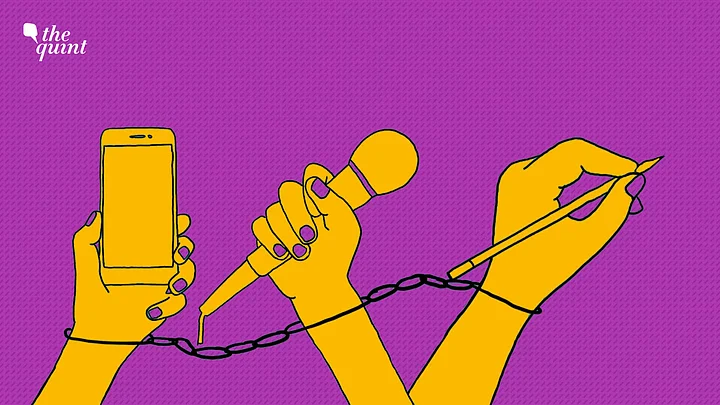With decades behind me in journalism, my favourite quote on the profession is from American journalist A J Liebling, who famously said: "Freedom of the Press Is Guaranteed Only to Those Who Own One."
The second quote, a funnier favourite, is from Adlai Stevenson: "An editor is someone who separates the wheat from the chaff and then prints the chaff."
As we mark World Press Freedom Day today, these quotes can explain what often goes wrong with journalism and the so-called 'Free Press' whose purpose is sometimes pompously equated with speaking truth to power. Sometimes media barons are the problem. Sometimes the editors they appoint or control are. And politicians, of course, are, through the various arms and ways of the state.
The government and sometimes folks, sinisterly described as "the System" can pressure the media baron or the editor to do or not do something. It often happens in winks, nudges, gestures and through what in India is called a "setting".
Battling The System
These thoughts come to mind after an eventful week in the world of journalism, with events or milestones telling us a thing or two that can somehow be explained by one of the two quotes above. The "system" is a labyrinth that the press has to negotiate in its struggle to be free and fair. It is not easy.
In one event, at the Columbia University (the same place famous for its journalism school), an anti-war activist confronted the Executive Editor of The New York Times, Joseph Kahn, and other editors who sat on a panel to face to ask tough questions. The activist hurled questions and accusations on the Ukraine war and the functioning of the media only to be hustled out by security guards.
The point is not that he was an activist who mixed insinuations and accusations with some hard questions. The point is that in the viral videos that did the rounds, the editors maintained a silence that was far from convincing.
In the same week, Richard Sharp, chairman of the much venerated and questionably autonomous BBC (British Broadcasting Corporation), resigned after it was revealed that he helped former British Prime Minister Boris Johnson secure a loan. You see Sharp is not a former journalist, but a former banker. (I am tempted to ask if a bank would ever ask a former journalist to be its chairman. You get the picture).
Persecution Against the Press Compromises Freedom
Across the Atlantic Ocean, US President Joe Biden was apparently roasted in an annual White Correspondents Association annual dinner but there were those such as Socialist Columnist Patrick Martin who described the roast as an act of hypocrisy in the real quest for press freedom.
Martin observed that WikiLeaks Founder and Publisher Julian Assange if he was extradited to the US from his London prison where he has been held without trial for years, would be the first journalist persecuted under a century-old law called the Espionage Act.
"...The most obvious case of a double standard (on the press) was one that involves the Biden administration directly: the persecution of Julian Assange," he wrote.
In the US, meanwhile, Fox News sacked Tucker Carlson, the right-wing programme host who is critical of Washington's support for Ukraine in its war against Russia. The reasons were not stated but his outspoken opposition to American support for Ukraine is cited as a key reason.
Carlson is right-wing and Assange is loved by the left, but both are victims of the system that limits press freedom—though neither of the two fit the conventional image of a dour, prodding, objective reporter or editor.
Democracy Comes Under Threat When Press Faces Attack
There are reports that suggest that Fox News CEO Lachlan Murdoch, son of media mogul Rupert Murdoch, may have had a role in the firing of Carlson, linked to his father's engaging in a call with Ukrainian president Volodymyr Zelensky.
You see, between media owners, tactically silent editors, and the "System" as a whole that has laws selectively targeting the media, freedom of the press is certainly under attack.
Last year, India slipped to the 150th rank among 180 countries in the World Press Freedom Index rankings.
With tax surveys on the BBC, journalists being intimidated under the Defamation Act and the use of Information Technology laws by the government to circumscribe journalistic work, India is not exactly a shining democracy when it comes to press freedom. The use of spyware like Pegasus shows that the pursuit of professional duties by journalists is also under secret surveillance.
You could, of course, point to the BBC and Fox News to say that freedom of the press is not a big deal in Western democracies either. Or, you can mention China as a comparison, a cruel one.
It was political philosopher Jean-Jacques Rosseau who said: "Man is born free but everywhere is in chains." You could simply replace "Man" with "The press" with similar insights.
Wherever you go, the watchdog, as the press is called, is occasionally drugged, sometimes chained, and often shown a stick or thrown a carrot. Because power over the press seems to be stronger than the power of the press.
(The writer is a senior journalist and commentator who has worked for Reuters, Economic Times, Business Standard, and Hindustan Times. He can be reached on Twitter @madversity. This is an opinion article and the views expressed are the author’s own. The Quint neither endorses nor is responsible for them.)
